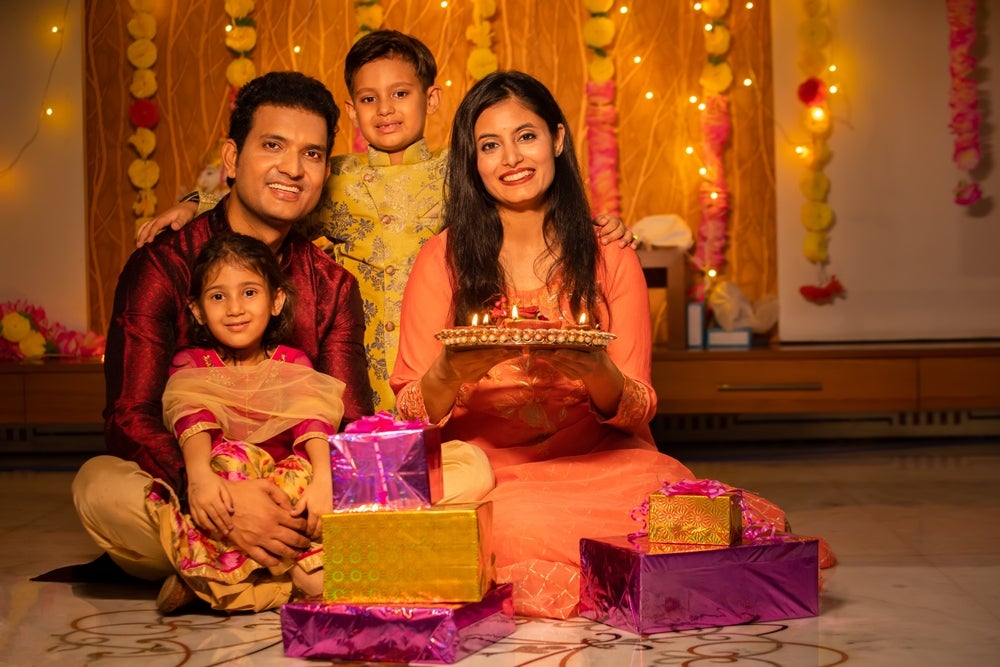Banner artwork by graphicsolutions7234 / Shutterstock.com
What is Diwali?
Diwali, also known as Deepavali, is a floating festival, known as the "festival of lights" commonly celebrated in India. Diwali usually falls between October and November, and will be celebrated this year on November 1st, 2024.
Taking place over a span of five days, Diwali is celebrated on the third day. The purpose of Diwali is to signify the triumph of good over evil and light over darkness. For the business community, it is often the end and beginning of the fiscal year, and a time to balance ledgers.

ACC spoke with Kriti Tannan, senior director — legal, JLL, and a 2023 ACC Top 10 30-Something, who is based in Bengaluru, India, about the details of the holiday.
She explained that the first day, Dhanteras, is for celebrating the Hindu Goddess of wealth, and also health (after all, health is wealth), Lakshmi. To welcome her, people buy new utensils, jewelry, and clothing to help bring good fortune.
On the second day, Naraka Chaturdasi or Chhoti Diwali, people decorate homes with Rangoli (design patterns on the floor using colored powders), light lamps and candles, and put up lights and enjoy fireworks to welcome prosperity from Goddess Lakshmi.

The third day continues the festivities. People continue to celebrate with fireworks and lights, and visit family and friends to celebrate, feast, and exchange sweets and gifts. They often perform Lakshmi puja, a prayer to Goddess Lakshmi.
On the fourth day, Govardhan Puja, people offer a large variety of vegetarian food to God Krishna as gratitude.
Lastly, on the fifth day, Bhai Dooj, siblings perform a ceremony called Tilak and pray for one another.
Hindus, Jains, Sikhs, and some Buddhists celebrate this holiday. The main day of the festival is an official holiday in Fiji, Guyana, India, Malaysia, Mauritius, Myanmar, Nepal, Pakistan, Singapore, Sri Lanka, Suriname, and Trinidad and Tobago.
Ways to celebrate
Each family may observe Diwali differently depending on their own traditions. Common ways people celebrate Diwali are by lighting oil lamps (diyas) and candles to signify the victory of light, cleaning and elaborately decorating their homes, eating special sweets and snacks, enjoying fireworks, shopping, and exchanging gifts with family members. Individuals may also perform religious ceremonies and prayers.
In the United States, more schools have started to acknowledge Diwali as a holiday, and since 2009 the White House has hosted a Diwali celebration, reflecting the increased recognition of the holiday.
What should in-house counsel be mindful of about Diwali?
1. Inclusivity — Many employees may come from diverse backgrounds. Recognizing and acknowledging religious holidays such as Diwali, can foster an inclusive workplace.
2. Workplace accommodation — Consider flexible work schedules for employees so that they are able to participate in their festivities with family and friends.
3. Compliance — Stay aware of any specific regulations and laws in your jurisdiction related to religious holidays such as Diwali.
• Review ethical considerations to prevent bribery/corruption or conflict of interest exclude any employees.
• Review anti-discrimination policies to ensure celebrations do not exclude any employees.
By recognizing the significance of Diwali and making appropriate accommodations, in-house counsel can help create a supportive and inclusive work environment.
Disclaimer: The information in any resource in this website should not be construed as legal advice or as a legal opinion on specific facts, and should not be considered representing the views of its authors, its sponsors, and/or ACC. These resources are not intended as a definitive statement on the subject addressed. Rather, they are intended to serve as a tool providing practical guidance and references for the busy in-house practitioner and other readers.




